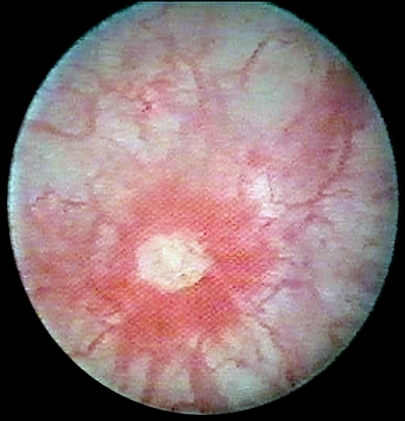Interstitial Cystitis
Interstitial cystitis (IC), also known as bladder pain syndrome (BPS), is a chronic condition characterised by persistent pain in the bladder and pelvic floor of unknown cause. It predominantly affects women and is often associated with other conditions such as irritable bowel syndrome, fibromyalgia, and depression.

Signs and Symptoms
The hallmark symptoms of IC/BPS include suprapubic pain, urinary frequency, painful sexual intercourse, and waking up from sleep to urinate. Patients may experience painful urination, pelvic pain exacerbated by certain foods or drinks, urinary urgency, and bladder or pelvic pressure. Pelvic pain generally worsens with bladder filling and may improve with urination. Some patients exhibit urinary hesitancy, discomfort, and difficulty in daily activities such as driving and working.
During cystoscopy, 5-10% of patients show Hunner's ulcers. Symptoms can vary greatly, from discomfort only in the urethra to severe pain in the entire pelvis.
Diagnosis
Diagnosing IC/BPS involves excluding other conditions with similar symptoms such as urinary tract infections, sexually transmitted infections, and bladder cancer. The diagnosis is based on clinical symptoms, and often involves a thorough medical history, physical examination, and laboratory tests.
The potassium sensitivity test, previously used to evaluate bladder wall integrity, is no longer recommended. Hydrodistention with cystoscopy may be employed in complicated cases. The ESSIC society proposed rigorous diagnostic criteria requiring pain associated with the bladder and at least one other urinary symptom, supported by a series of tests including urinalysis, urine cultures, and cystoscopy.
Causes
The exact cause of IC/BPS remains unknown, but several theories have been proposed, including autoimmune, nerve, mast cell, leaky lining, and infection theories. Many patients exhibit a damaged urothelium, or bladder lining, which allows urinary chemicals to "leak" into surrounding tissues, causing pain and inflammation. Genetic factors may also play a role, with some genetic subtypes linked to the disorder.
Treatment
There is no cure for IC/BPS, and management can be challenging. Treatments aim to improve symptoms and may include lifestyle changes, medications, and procedures. The American Urological Association provides a tiered approach to treatment:
- First-line treatments: Education, self-care (diet modification), and stress management.
- Second-line treatments: Physical therapy, oral medications (amitriptyline, cimetidine, hydroxyzine, pentosan polysulfate), and bladder instillations (DMSO, heparin, lidocaine).
- Third-line treatments: Treatment of Hunner's lesions, low-pressure and short-duration hydrodistention.
- Fourth-line treatments: Neuromodulation (sacral or pudendal nerve).
- Fifth-line treatments: Cyclosporine A, botulinum toxin (BTX-A).
- Sixth-line treatments: Surgical interventions (urinary diversion, augmentation, cystectomy).
Bladder Distension
Bladder distension under general anaesthesia, or hydrodistention, can provide temporary relief from symptoms by stretching the bladder capacity. However, the relief is usually short-term, and the exact mechanism is unclear.
Bladder Instillations
Bladder instillation involves placing medication directly into the bladder, allowing direct contact with the bladder lining and minimal systemic side effects. DMSO is the only approved bladder instillation for IC/BPS but is less frequently used.
Diet
Diet modification is often recommended as a first-line treatment. Patients are advised to avoid trigger foods and beverages such as caffeine, alcohol, chocolate, citrus fruits, hot peppers, and artificial sweeteners. An elimination diet can help identify individual triggers.
Medications
Oral medications used include amitriptyline, which has shown effectiveness in reducing chronic pelvic pain and nocturia. Pentosan polysulfate is believed to repair the bladder's protective glycosaminoglycan coating. Other medications include hydroxyzine and cyclosporine A.
Pelvic Floor Treatments
Physical therapy targeting the pelvic floor muscles can reduce symptoms. Techniques such as myofascial release and progressive relaxation therapy are used to alleviate muscle tension and pain.
Surgery
Surgery is considered a last resort for severe, refractory cases. Interventions include bladder augmentation, urinary diversion, and cystectomy. Neuromodulation techniques like TENS and percutaneous tibial nerve stimulation have also shown promise in symptom relief.
Epidemiology
IC/BPS affects both men and women, with a higher prevalence in women. It is estimated that around 0.5% of people are affected, with onset typically in middle age. The condition significantly impacts the quality of life, comparable to end-stage kidney disease or rheumatoid arthritis. IC/BPS is officially recognised as a disability in the United States.
Self-assessment MCQs (single best answer)
What is the hallmark symptom of Interstitial Cystitis/Bladder Pain Syndrome (IC/BPS)?
Which diagnostic test is no longer recommended for evaluating bladder wall integrity in IC/BPS patients?
What percentage of IC/BPS patients exhibit Hunner's ulcers during cystoscopy?
Which of the following is NOT a first-line treatment for IC/BPS according to the American Urological Association?
What percentage of people are estimated to be affected by IC/BPS?
What is the primary purpose of bladder distension (hydrodistention) in IC/BPS treatment?
Which oral medication is believed to repair the bladder's protective glycosaminoglycan coating?
Which of the following foods are commonly advised to be avoided by IC/BPS patients?
Which treatment option is considered a last resort for severe, refractory IC/BPS cases?
Which of the following is NOT a proposed theory for the cause of IC/BPS?
Dentaljuce
Dentaljuce provides Enhanced Continuing Professional Development (CPD) with GDC-approved Certificates for dental professionals worldwide.
Founded in 2009 by the award-winning Masters team from the School of Dentistry at the University of Birmingham, Dentaljuce has established itself as the leading platform for online CPD.
With over 100 high-quality online courses available for a single annual membership fee, Dentaljuce offers comprehensive e-learning designed for busy dental professionals.
The courses cover a complete range of topics, from clinical skills to patient communication, and are suitable for dentists, nurses, hygienists, therapists, students, and practice managers.
Dentaljuce features Dr. Aiden, a dentally trained AI-powered personal tutor available 24/7 to assist with queries and provide guidance through complex topics, enhancing the learning experience.
Check out our range of courses, or sign up now!


